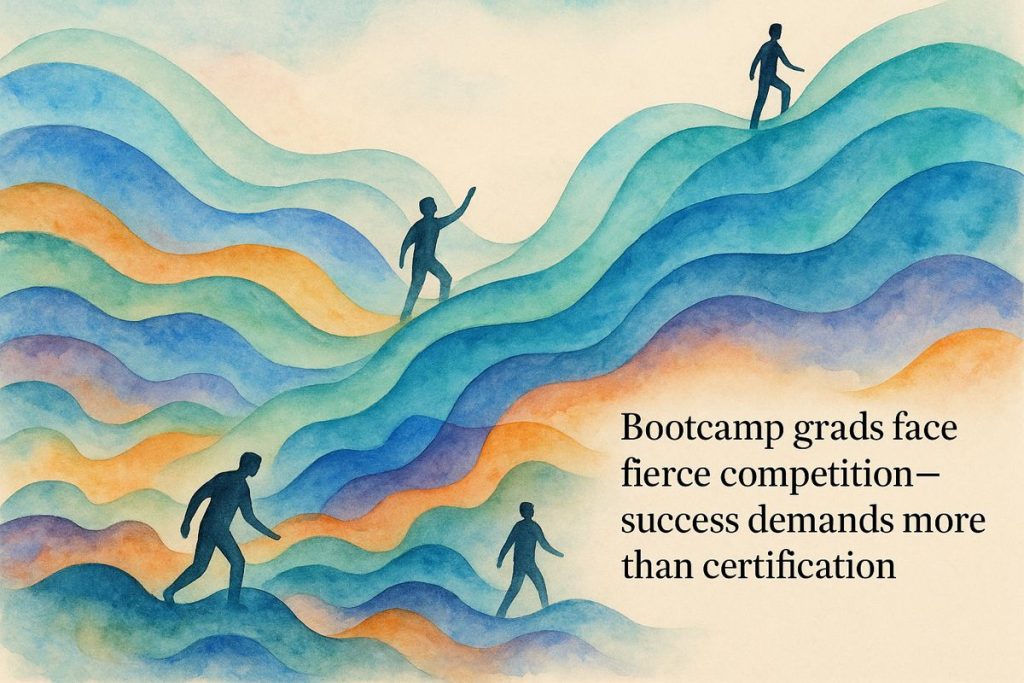Salesforce bootcamps in 2025 are fast, focused training programs that help people quickly learn and get certified as Salesforce admins or developers. They promise big career opportunities, but can be expensive and come with tough competition, as many graduates chase similar jobs. While bootcamps teach important skills and offer networking, real-world experience and hands-on practice are still needed to stand out. In 2025, employers want more than just certificates—they want people who understand business, new tech like AI, and can handle complex, real problems. Bootcamps can open doors, but they are just the beginning of a longer learning journey.
What should you know about Salesforce bootcamps in 2025?
Salesforce bootcamps in 2025 offer intensive, fast-track training for aspiring admins and developers, focusing on certification and practical skills. While they can boost learning efficiency and open career doors, costs, fierce competition, and the need for real-world experience beyond certification remain important considerations.
The Bootcamp Boom: Why Now?
It’s a foggy morning—coffee in hand, you’re scrolling LinkedIn, and there they are again: Salesforce bootcamp success stories. Hundred-hour weeks distilled into shiny credentials. But does the aroma of opportunity match the taste? Salesforce bootcamps have become, in less than a decade, the express elevator for legions of would-be admins and developers eager to join the CRM colossus that powers nearly 90% of Fortune 500 companies. It’s a heady proposition. Almost too heady? I’ll admit, the first time I heard about Trailblazer Bootcamp, I imagined a sort of technical Hogwarts—fast, magical, and, perhaps, a little too good to be true.
Here’s the deal: these bootcamps, from the official Trailblazer Bootcamp to upstarts like Saasguru and IQ StreamTech, promise to compress what used to be a year-long crawl into a caffeinated sprint of weeks. You’ll find intensive, instructor-led sessions, real-world mini-projects, and hands-on labs—sometimes all crammed into a calendar fortnight. The virtual classroom hums with the white-noise of ambition… and, occasionally, mild panic.
So, what exactly are you signing up for when you enroll? And why does the air feel charged with both promise and peril? Salesforce Ben (a.k.a. Ben McCarthy) over at Salesforce Ben asks similar questions—and not just rhetorically. The bootcamp ecosystem, he warns, is a palimpsest: yesterday’s gold rush overlaid with today’s marketing sheen.
Fast Lanes, Hard Turns: What Bootcamps Really Offer
Bootcamps are sold as a ticket to six-figure jobs, a claim that’s both alluring and, well, just this side of hyperbolic. According to an IDC study, instructor-led Salesforce training can make you 68% more efficient at learning than going solo. That’s a spicy statistic, but let’s not pretend the finish line is always where you expect. The job market, especially in 2025, is less a conveyor belt and more a game of musical chairs—sometimes the music stops, and you’re left standing.
What you do get: bootcamps aligned with the laser focus of official certifications (think: Salesforce Certified Administrator, Platform App Builder), which are still the lingua franca of the hiring world. There’s structure, peer learning, resume polish, and often—if you’re lucky—a capstone project that feels, for a moment, like the work you’ll do after the lanyard and balloons of graduation day dissipate. Networking? Absolutely. Sometimes, a message from a fellow bootcamper will open more doors than your freshly minted badge.
Yet, the story isn’t all confetti and quick-wins. Ben McCarthy, in his Ultimate Guide, points out the chasm between certificate and competence. You’ll be thrown into the fray with dozens, sometimes hundreds, of other hopefuls—each clutching their credentials like golden tickets. The competition is as fierce as a caffeinated mongoose, and the path from bootcamp to boardroom is rarely linear.
The Price of Speed: Risks Beneath the Surface
Let’s be real: chasing the dream can get expensive, fast. Some programs, particularly those with big-brand gloss, command fees north of $1,500. I once burned my monthly rent payment on a “guaranteed” job program—spoiler, the only guarantee was my credit card bill. Oof. Sure, some land gigs within weeks, but many spend months in the liminal space between certification and career, networking like it’s a second job.
And there’s another catch. Crunched timelines mean you might breeze by the gnarly, hyperspectral complexities of real-world Salesforce work—especially in regulated industries like life sciences. Cloudwise Learning, for example, stresses continuous hands-on practice as essential, beyond the classroom. Employers in 2025 want more than a cert—they want someone who can make sense of business process spaghetti, who’s not fazed when a system integration hiccups at 2 a.m.
Emotionally? The ride can be a kaleidoscope: excitement, then anxiety, then—bam!—that fleeting surge of confidence as you pass a mock exam. But sometimes, doubt creeps in. Is a bootcamp enough? Am I enough? I’ve been there, and here’s my two kopecks: the uncertainty is part of the process. You learn, you adapt, you move forward.
The New Salesforce Pro: What 2025 Demands
It isn’t just about certifications anymore. The Salesforce ecosystem has mutated—think digital transformation on rocket fuel. Today, the best admins and developers possess business acumen, a working familiarity with AI-driven automation, and an insider’s grasp of data integration. Salesforce Ben’s latest video lists seven trends shaping the year, from AI proficiency to the rise of no-code automation. If you’re still thinking only about objects and fields, you’ll be left in the dust.
Hiring managers now crave experience—real, lived-in, occasionally messy. Capstone projects,
